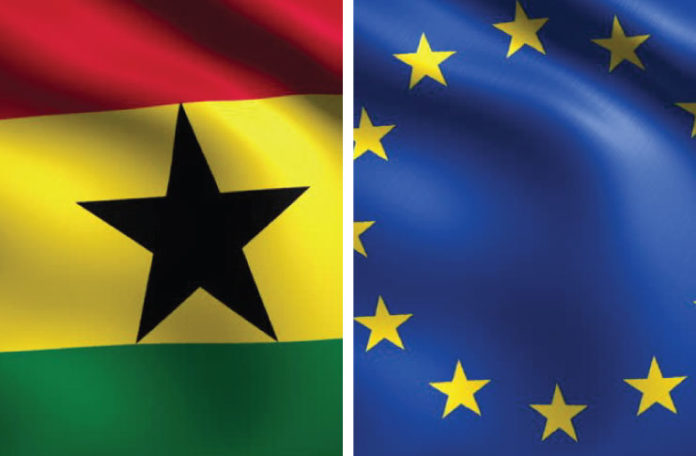Finally, the long-standing Economic Partnership Agreement between Ghana and the European Union (EU), which has seen a delay of close to five years, has come into force, enabling the country and Europe to trade duty-free and quota-free on some selected goods.
According to a joint press release from the Trade Ministry and the EU, the interim Economic Partnership Agreement (iEPA), which takes immediate from July 1, 2021, will guarantee duty-free quota-free access to the EU market for products made in Ghana, giving the country access to the European market for 80 percent of the total volume of exports to the bloc.
Details of the agreement indicates Ghana will progressively reduce its tariffs to zero for 78 percent of its imports from the EU by 2029. The tariff cutting process started in 2020, creating significant new export opportunities for EU exporters. In the future, the EU and Ghana might decide to expand the EPA to include, for example, provisions on investment and trade in services.
The timetable for tariff liberalisation also shows by end of 2021, Ghana will remove duties for products from the EU where tariffs are at 5 percent and 10 percent. Then, in 2024, almost half of the total lines to be liberalised will be at 0 percent; and in 2029, those products currently at 20 percent and 35 percent will be fully liberalised (unless excluded).
In addition, several EU development cooperation programmes are linked to the EPA, as they aim to facilitate the reform of the fiscal revenue system, improve the business environment and Ghana’s competitiveness.
One of such programmes is the Investment Promotion and Business Linkages project, implemented in partnership with the Association of Ghana Industries (AGI), which seeks to support the export readiness of Ghanaian SMEs. It supports SMEs to strengthen their business profile, undergo due diligence processes, understand buyer requirements and negotiate with importers and buyers.
However, the agreement makes room for certain industries and products to be exempted. Ghana will not remove import duties for a number of agricultural and non-agricultural processed goods, including: frozen poultry (current import duties at 35 percent); worn clothing (import duty now at 20 percent); sugar (now at 20 percent); margarine (now at 20 percent); and frozen beef (now at 35 percent).
Others include food preparations n.e.s. (20 percent); animal feed (now at 5 percent); non-alcoholic beverages (now at 20 percent); frozen mackerel (now at 10 percent); frozen tuna (now at 10 percent); ceramics (now at 20 percent); and cement (now at 20 percent)
Both government and the EU say the agreement has mutual benefits which ensures a win-win situation for both parties, allaying fears that the EU wants to take advantage of the country.
“This is crucial for developing and diversification of our bilateral trade. It also creates better opportunities for EU companies to trade and invest in Ghana and produce goods for export to the wider African market under the preferences available under the African Continental Free Trade Area.
The removal of tariffs on intermediary goods and machinery from the EU under the iEPA will mean cheaper inputs for Ghanaian production. This will also make locally produced goods more competitive and support industrial development in Ghana and the country’s integration into global value chains.
In addition, trade-related development cooperation under the iEPA will facilitate reforms of the fiscal revenue system, improve the business environment and promote the upgrading of the productive sectors in Ghana,” the joint press release stated.
Although the iEPA was concluded in December 2007, and ratified by Ghana in 2016, the implementation of the tariff liberalisation schedule was delayed pursuant to technical adjustments agreed between the EU and Ghana.
The necessary rules of origin documents to be used for trading including the certificates of origin and origin declarations have now been developed and the codes and systems are in place for the start of the effective implementation of tariff cuts for EU products entering Ghana.
The press release says trading under the iEPA reaffirms the deep interest of both Ghana and the EU to strengthen their longstanding trade and economic relationship. It also underscores their shared ambition to enhance relations between the EU and the Economic Community of West African States (ECOWAS) and African States more broadly.










